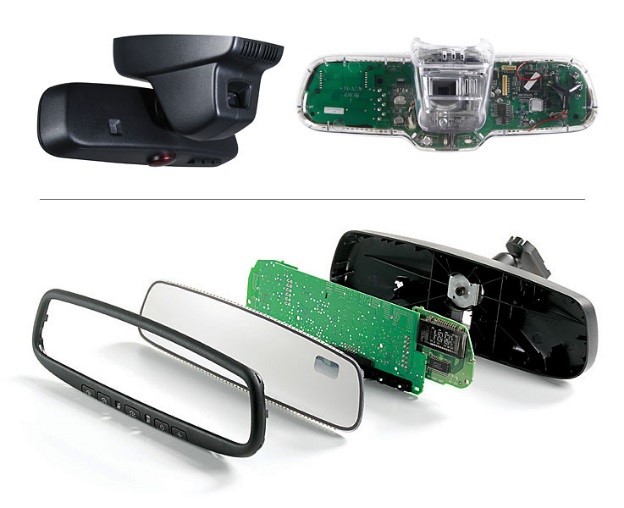Top 5 Auto Trends from CES 2019
Last week at the Consumer Electronics Show (2019) in Las Vegas, the latest innovations and trends in the automotive market were on showcase. The event featured new product announcements from major players such as Ford, HARMAN, Volkswagen, Audi, and more. Below are five key trends from CES that we expect to influence the market in 2019:
-
Authentication technologies – Parks Associates research shows increasing consumer concerns around companies and hackers stealing their data and/or identity, as well as how hacked data and devices will be used. Frictionless authentication can decrease
 vulnerability and help allay consumer concerns. At CES, Gentex introduced biometric authentication rearview mirrors that can identify drivers with an iris scan and start the car with all of their preferred driver settings, such as seat and mirror position, temperature preference, and choice of radio station. The system can also be used to help secure and enhance vehicle-to-home automation services, and even enables vehicle-to-infrastructure transactions. As strides continue to be made in authentication technologies, expect more innovation around fingerprint, voice, and facial recognition authentication in 2019 and beyond.
vulnerability and help allay consumer concerns. At CES, Gentex introduced biometric authentication rearview mirrors that can identify drivers with an iris scan and start the car with all of their preferred driver settings, such as seat and mirror position, temperature preference, and choice of radio station. The system can also be used to help secure and enhance vehicle-to-home automation services, and even enables vehicle-to-infrastructure transactions. As strides continue to be made in authentication technologies, expect more innovation around fingerprint, voice, and facial recognition authentication in 2019 and beyond.
-
Voice control enters the car – Parks Associates research shows that 31% of U.S. broadband households own a smart speaker with voice assistants, such as Amazon’s Echo or the Google Home. These devices have increased more than 900% since Q1 2016, and Alexa and Google Assistant are now entering the car. While carmakers already offer voice control through the car’s infotainment system, manufacturers are now turning to companies like Amazon and Google for a more natural language experience in the car and greatly expanded use cases that come with intelligent assistants. BMW, Ford, Toyota, and Volkswagen have introduced Amazon’s cloud-based Alexa solution to some of its vehicles, but more cars will feature this tech in 2019. By using voice commands to control the car’s infotainment system, GPS system, and song selection, car owners can increase safety by focusing more attention on the road and the surrounding environment. Assistants by Amazon and Google also boast greater capabilities by connecting the user in the car to the rest of the connected life – their home, purchases, work schedule, etc.
-
AI hits the automotive market – At CES, Volkswagen showcased its use of artificial intelligence (AI) using software and hardware from NVIDIA that recognizes a user’s face as he/she approaches their car to automatically unlock the doors. The solution can also monitor a driver’s eyes for alertness and utilize deep-learning to improve the vehicle’s autonomous driving skills. Volkswagen has set production for 2022. Meanwhile, Massachusetts-based AI company Nuance showcased an Alexa-like system that allows consumers to use voice control not just for navigation and song selection, but also for operating the doors and windows and even providing information on surrounding buildings. The solution includes face and eye tracking hardware mounted behind the steering wheel and recognizes what users are looking at when they ask a question. The system does not require any wake word, constantly listening for the driver’s voice in order to react the moment the driver says a command related to the vehicle.
-
Improvements made in driver safety – HARMAN, which had a large showroom at the Hard Rock Hotel and Casino during CES, has partnered with Innoviz Technologies to bring LiDAR to more automakers. The solution works with forward-facing cameras and utilizes HARMAN’s sensor fusion technology to help cars better see where they are going and help detect objects ahead with more speed and accuracy. The solutions are in preparation for more wide-scale autonomous driving features in the future.
-
Truly autonomous driving nearing reality – Autonomous driving features and solutions were aplenty at CES. While this vision is still years from actualization, strides could be seen through partnerships like that of Ford and chip maker Qualcomm. The two companies have partnered for their C2VX technology that uses a chip in your car to communicate with other vehicles on the road while also receiving data from traffic lights or road signs. The solution can alert drivers to problems such as accidents or stalled cars ahead of time. Vehicle-to-vehicle communication will ultimately expedite the autonomous dream and lead to safer roads in the long term.
Parks Associates will address the connected car market at its 23rd-annual CONNECTIONS: The Premier Connected Home Conference, May 21-23 at the Hyatt Regency San Francisco Airport. The executive conference includes presentations from Parks Associates’ leading analysts and sessions on the connected entertainment and digital home technology industries.
For Parks Associates research on authentication technologies, see Innovations in Authentication and Personalization Technologies. For Parks Associates research on artificial intelligence, see AI, Machine Learning, and Data Analytics in the Smart Home.
Next: Parks Associates Announces Connected Car Corner, by InstallerNet, at CONNECTIONS
Previous: TVs are Huge at CES 2019
Comments
-
Be the first to leave a comment.
Post a Comment
Have a comment? Login or create an account to start a discussion.


